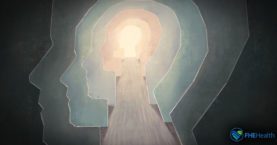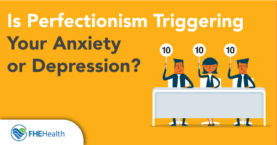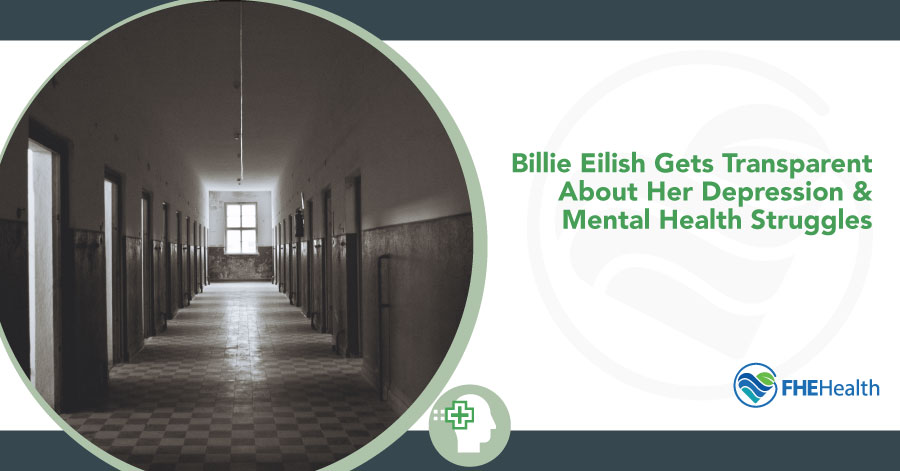
“I didn’t think I would ever make it to this age.” Billie Eilish
Singer and songwriter Billie Eilish may be just 22 years old, but she’s already achieved what many performers aspire to for their entire careers. The young Los Angeles-born star has been nominated for nine Grammy Awards, six MTV Video Music Awards, three Brit Awards, and numerous other accolades. Though fans love her music, they’re also drawn to her singular style.
Eilish is known for her baggy clothing and unique fashion sense. Like many stars who’ve enjoyed a meteoric rise to fame, she’s not invulnerable to the toll the entertainment business can take on a person’s mental health and well-being. Even before her career took off, Billie Eilish’s depression and mental health struggles meant she was living life in hard mode.
Billie Eilish: Her Career and Rise to Popularity
Eilish was born in 2001 and in 2019 became the first singer born in the 2000s to have a No. 1 song in the United States. As a child of parents in the entertainment business, Eilish grew up in Los Angeles and was homeschooled. At age 8, she enjoyed singing with the choir but was eager to begin writing her own songs as early as age 11. Not long after, her brother wrote a song called “Ocean Eyes” that he performed with his band. They recorded Billie singing the song and released it online, and it became a smash.
“Ocean Eyes” opened the door to new career opportunities for Billie. Eventually, she released her debut album, “When We Fall Asleep, Where Do We Go?” Eilish garnered throngs of new fans and began to achieve critical acclaim. Her album “Hit Me Hard and Soft” debuted at No. 2 on the Billboard 200, with all 10 songs making it into the Top 40 of the Billboard Hot 100.
Despite her efforts to focus on her artistry, Billie Eilish’s mental disorder treatment has been the subject of discussion, and she doesn’t shy away from talking about her experiences.
Billie Eilish’s Depression in Her Own Words
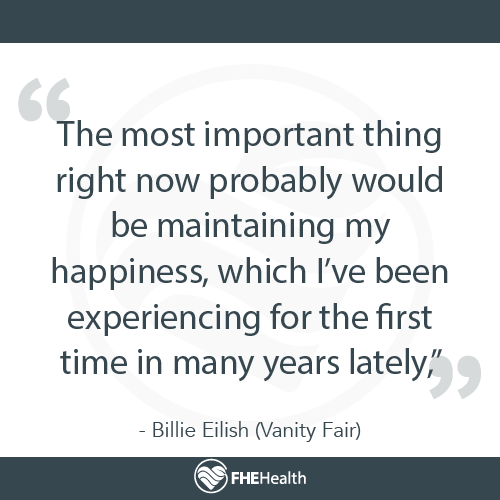
“I didn’t think that I would be happy again.” That’s what Eilish stated as she reflected on the depression she suffered around age 16. But that wasn’t the first time she experienced a profound mental health disturbance. Eilish reports that she’s dealt with issues that include depression, anxiety, and self-harm since the age of 13.
She believes that leaving dance behind was a trigger for the depression. According to an article about her battles with depression, her struggles started after she injured a growth plate in her hip and had to end her dance career at age 13. She also struggled with anxiety, noting that she had severe separation anxiety and insisted on sleeping with her parents until she was 10.
Billie Eilish’s depression took a serious turn when she began to self-harm. She said that she felt as if she deserved to be in pain. As fame set in, Eilish experienced panic attacks and night terrors. Eventually, Eilish sought therapy for her struggles, and that did help for a while. In fact, she stated, “17 has probably been the best year of my life. I’ve liked 17.”
However, Eilish found herself battling depression again and struggling with Tourette syndrome. In 2022, she gave an interview with David Letterman, where she highlighted her tics and said, “These are things you would never notice if you’re just having a conversation with me, but for me, they’re very exhausting.” Eilish is happy to speak about her experiences with Tourette syndrome and depression to help educate those who may be unaware of the conditions and what they mean.
She gave another interview with Rolling Stone in 2024 where she explained, “My whole life, I’ve never been a happy person, really.” She described her most recent bout of depression as “just realer than it’s ever been before.” Even day-to-day tasks became a challenge for her, but with support from loved ones, she was able to “bite the bullet and exist in the world.”
Accusations of Faking It for Marketability
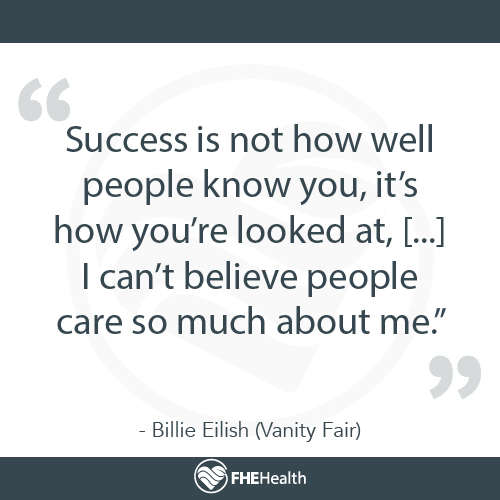
Some people have commented that the young star simply experienced what many teens do or that she’s overdramatizing her depression as a way to market herself. Some question the authenticity of Billie Eilish’s tics, wondering if they were played up for the cameras. After all, she wouldn’t be the first artist to capitalize on relatable, depressive lyrics and unconventional lifestyles.
But there’s a danger in making assumptions about anyone’s mental health state. Billie Eilish’s Tourette syndrome and mental health concerns are between her and her medical team, and the relentless speculation and monitoring that the mainstream media engages in, especially when aimed at young stars, only puts extra strain on people whose childhoods have already been hugely challenging.
It’s always dangerous not to take someone’s depression seriously. On average, there are about 129 suicides a day. And in the United States, that rate is climbing. Eilish has reported that the accusations have hurt her, but she doesn’t regret opening up about her mental health because she believes that it could encourage others to get help and understand that recovery is possible.
Is It Healthy to Dwell on Depressing Things When You’re Depressed?
For many people, the experience of dwelling in sad music when they’re feeling blue isn’t uncommon. The events and emotions we experience in life can be hard to consolidate. Life is messy. However, when something is in a song and can be easily digested, it gives a sense of structure to the world.
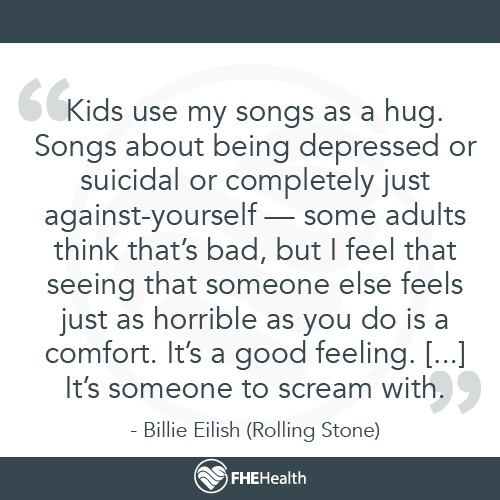
When we find companionship in our sorrow, we’re less likely to feel alone and isolated in our sadness, which may help bring us out of it sooner. Eilish said to Rolling Stone, “Kids use my songs as a hug … Songs about being depressed or suicidal or completely just against yourself — some adults think that’s bad, but I feel that seeing that someone else feels just as horrible as you do is a comfort. It’s a good feeling. It’s someone to scream with.”
However, during her 2019 interview with Rolling Stone, Eilish said that she had to stop watching horror movies even though she formerly enjoyed them. They exacerbated her nightmares, night terrors, and anxiety. That’s not surprising. Ruminating or brooding on negative thoughts can exacerbate symptoms of depression.
Depression Does Not Discriminate, But Help Is Out There
Billie Eilish is under no obligation to share her personal struggles or her private health issues. But in doing so, she does a great service to other people who may also be trying to cope with depression, anxiety, and self-harm. Her willingness to be up-front and matter-of-fact about her problems and the long, winding road to recovery can inspire other people to get help and believe their own recovery is possible.
Mental health conditions like depression and anxiety can’t always be cured — but they can often be managed effectively with the right treatment. Some people may experience a serious depression crisis, go through treatment, and never feel the same level of depression or angst again, while others may struggle with depression and anxiety on a routine basis.
When depression or any other mental health issue pops up, seek help at a high-quality mental health treatment center like FHE Health. The sooner you get help, the sooner your recovery journey begins — and as Eilish says, “It feels great to feel good.” Contact FHE Health today to book a confidential consultation with one of our counselors.

